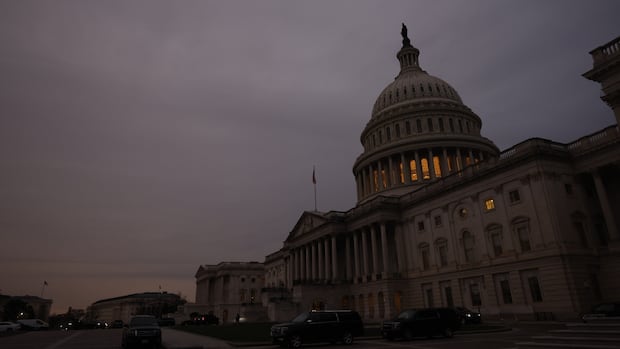The Republican-controlled US House of Representatives passed legislation on Friday that would prevent a midnight government shutdown, defying President-elect Donald Trump’s request to also greenlight trillions of dollars in new debt.
The Democratic-controlled Senate must then pass the bill to ensure the US government will be funded after midnight, when current funding runs out. If approved by the Senate, President Joe Biden intends to sign it into law, the White House said.
The legislation would extend government funding through March 14, provide $100 billion for disaster-stricken states and $10 billion for farmers. It would not, however, raise the debt ceiling, a tall order that Trump has pushed Congress to complete before taking office on January 20.
House Speaker Mike Johnson said Republicans will have more power to influence government spending next year when they hold majorities in both houses of Congress and Trump is in the White House.
“This was a necessary step to bridge the gap to put us at that point where we can put our fingerprints on the final spending decisions,” he told reporters after the vote. He said Trump supports the package.

A government shutdown would disrupt everything from law enforcement to national parks and freeze the paychecks of millions of federal workers. A travel industry trade group has warned that the shutdown could cost airlines, hotels and other companies US$1 billion a week and cause widespread disruption during the busy Christmas season. Authorities warned that passengers could face long lines at airports.
The package, which passed by a bipartisan vote of 366-34, resembled a bipartisan plan that was abandoned earlier this week after an online barrage from Trump and his billionaire adviser Elon Musk, who said it contained too many unrelated provisions, such as a pay raise for legislators and a crackdown on pharmacy benefit managers.
Republicans rejected most of those elements of the bill — including a provision limiting investment in China that Democrats say would conflict with Musk’s interests.
“He obviously doesn’t want to answer questions about how much he plans to expand his business in China and how much American technology he plans to sell,” Democratic Rep. Rosa DeLauro said on the floor.
Musk happy with the deal
Trump has tapped Musk, the world’s richest man, to head a budget-cutting task force, but Musk holds no official position in Washington.
Musk wrote on his social media platform X that he was happy with the package. “It went from a note that weighed pounds to a note that weighed ounces,” he posted.
House Democratic Leader Hakeem Jeffries said the package still achieves important goals, such as providing disaster relief, preventing a shutdown and stopping Republicans from enacting an increase in the debt ceiling that would facilitate tax cuts.
“We have successfully met the needs of ordinary Americans, but there are still things to work on and we look forward to this battle in the new year,” he told reporters.
Trump’s request to raise the debt ceiling was soundly rejected by the House – including 38 Republicans – on Thursday.
The federal government spent an estimated $6.2 trillion last year and is more than $36 trillion in debt, and Congress will need to act to authorize further borrowing by the middle of next year.
Congressman Rich McCormick, one of 34 Republicans who voted against the bill, said it does not change the nation’s fiscal trajectory and will only add to the debt. “We’re going to be the country of the past if we keep doing what we’re doing,” he said.
Most recently, the federal government shut down for 35 days during Trump’s first term because of a border security dispute.
Previous battles over the debt ceiling have spooked financial markets, as a US government default would trigger credit shocks around the world. The cap has been suspended under an agreement that technically expires on Jan. 1, though lawmakers probably wouldn’t have to take up the issue until the spring.
https://i.cbc.ca/1.7417009.1734734354!/fileImage/httpImage/image.jpg_gen/derivatives/16x9_1180/view-of-the-u-s-capitol-building-from-afar.jpg?im=Resize%3D620
2024-12-20 23:33:48

